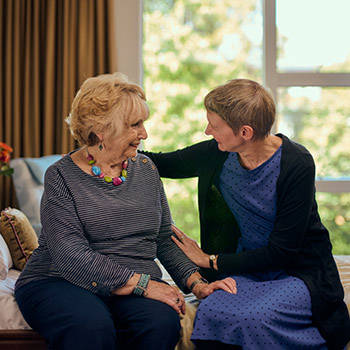- Home
- Guides & support
- Respite care: A guide for carers
Last updated 28 November 2025
Respite care: A guide for carers
Providing care for a loved one requires a lot of dedication, selflessness, and commitment. For most, it’s a job that offers a huge sense of reward, providing you and your loved one with a reassuring familiarity.
However, full time caring can also be demanding for carers, both mentally and physically. After all, when you spend so much time thinking about the needs of someone else, it can be easy to let your own slip, and it’s common for many carers to feel stressed, overtired, or burnt out.
 That’s why every now and again, taking a step back from full time caring and making some time for you is so important. Services like respite care, where a loved one can receive temporary care at an Anchor residential care home, can be incredibly valuable to carers who feel they need a break.
That’s why every now and again, taking a step back from full time caring and making some time for you is so important. Services like respite care, where a loved one can receive temporary care at an Anchor residential care home, can be incredibly valuable to carers who feel they need a break.
In this guide you'll find:
- What is respite care?
- When is respite care appropriate?
- How to organise a short care break
- How long can respite care last?
- Who pays for respite care?
- What are the benefits of respite care for carers?
- Transitioning to full time care
- Respite care at Anchor
What is respite care?
Also known as a short care break, respite care allows a person to stay at a care home on a temporary basis. Depending on the circumstances and an individual’s needs, a respite stay can range from about a week to a few months, and can be arranged on a recurring or one off basis.
When is respite care appropriate?
Respite care can be arranged for a range of reasons, covering a variety of planned or unplanned circumstances.
It could be that a carer is temporarily unavailable to provide care and that emergency respite care is needed; for example, if they need to take time away for an operation, a hospital stay, or due to illness.
Carers can also arrange short care breaks to coincide with holidays, where a relative may not want to join, or may be unable to join them.
Respite care is also beneficial for carers who may just want a short break from full time care, whether this is to spend more time focusing on another area of life, or simply to recharge.
How to organise a short care break
If the carer is aware they will need to be away, then a respite stay can be arranged with a care home in advance. However, if needed respite stays may also be arranged on a short notice emergency basis if a carer is away unexpectedly, or for longer than expected.
 Some people benefit from arranging a recurring respite stay for a loved one, where a relative stays in a home for a pre-planned amount of time on a regular basis. This allows both the carer and loved one a regular break, and affords each some valuable time to themselves and a sense of independence from one another.
Some people benefit from arranging a recurring respite stay for a loved one, where a relative stays in a home for a pre-planned amount of time on a regular basis. This allows both the carer and loved one a regular break, and affords each some valuable time to themselves and a sense of independence from one another.
In some care homes respite can also be arranged as a day care service, where visitors can attend a home for a few hours a day. As well as giving carers a break and providing visitors with a change in daily routine, day care can also help visitors feel part of a community and be something to look forward to.
To organise a short care break the first step is to contact the care home you are interested in and ask about the respite services they are able to provide. Most homes will be happy to explain their services in detail, answer your questions and invite you to come and visit in person.
How long can respite care last?
As described previously, there are lots of reasons why people arrange respite care and therefore respite care services can vary in duration based on your needs and the care home’s availability. At Anchor, we understand that families have different requirements for respite care and so we tailor our services to you. Our home's do their best to offer flexible solutions and will discuss options that can range from days to months with you, as part of the enquiry process.
Who pays for respite care?
There are three different ways respite care in a residential care home setting is usually paid for. These are:
- By the council: councils/Local Authorities may be able to pay towards respite care if you have completed a care needs assessment and carer's assessment.
- Grants or charities: carers may be able to apply for grants and financial help from charities such as the Carers Trust.
- Self-funding care for yourself or a loved one.
You can find out more about care home fees and funding assistance in our detailed guide here.
What are the benefits of respite care for carers?
It can sometimes be hard for carers to admit that they need to take a break, but doing so from time to time is important. Without a regular break, the everyday demands of full time care can become too much, which can lead to stress and exhaustion, often called “caregiver burnout”.
Respite for carers can provide a valuable opportunity to momentarily step back from the pressures of day-to-day caregiving. With a temporary break from caring, carers can spend time focusing on family, work, hobbies and personal health and wellbeing.
 Does it benefit individuals in care?
Does it benefit individuals in care?
It’s not only carers that benefit, the break in routine afforded by respite care is equally valuable to those being cared for. Being in receipt of full time care has the potential to be isolating, especially for those who are unable to carry out day to day tasks independently. Short term respite care allows visitors the opportunity to meet new people, experience different environments, and take part in a wide range of different activities.
Short term stays are not all the same, and each visitor receives an experience that is tailored to them, regardless of the length of stay. This includes receiving personalised care and support, having the choice of a wide range of activities to take part in, and being able to choose from a carefully planned and regularly updated menu.
You can read more about what to expect during a respite stay at an Anchor care home here.
Transitioning to full time care
Respite care and short term stays can also provide a good opportunity to become familiar with a care home environment. For carers and relatives, respite care, short term stays, and day care can be helpful first steps towards moving from caring at home to permanent care home residency.
Moving straight from a family home into care can be a huge transition, both for carers and the person being cared for. However, many find that the process is made much easier when they have experienced respite care first, especially when both parties are familiar with the care home, its team, other residents living there and the facilities available.
If a person decides to become a permanent resident after a short stay in an Anchor care home, many of their care requirements and preferences will already be on file from their respite stay, and this knowledge can help the care home’s team support them to settle in more quickly. While most people decide on the same care home for respite care and permanent residency, short term stays can also provide an opportunity to explore a number of different locations. This way, carers and relatives can decide on a home through first-hand experience, and choose the care home that is most suitable for them.
You can read more about the range of ways respite breaks and short stays in a care home environment can help prepare new residents and their carers for the transition to full time residential care in our guide to preparing for full time care.
Respite care at Anchor
Many of our care homes offer respite care and short-term stays. Simply search for a location and find properties within the region that offer respite care. Not sure which care home will be best for your loved one? Explore our Guide to Choosing a Care Home for help and advice.
Guides on making decisions and moving to a care home
This website uses cookies which track activity so that you get the best possible experience. By continuing to use this website we will assume you are happy and cookies will be set. You can change your cookie settings at any time.

















